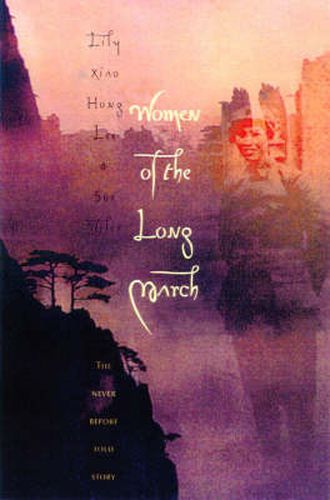Readings Newsletter
Become a Readings Member to make your shopping experience even easier.
Sign in or sign up for free!
You’re not far away from qualifying for FREE standard shipping within Australia
You’ve qualified for FREE standard shipping within Australia
The cart is loading…






Just seventeen when they became lovers, Mao’s second wife, He Zizhen was condemned to a life of loneliness after he tired of her. A strong young peasant who only wanted to be a soldier, Kang Keqing was called the Girl Commander. Married at seventeen to a man she didn’t know, the illiterate peasant girl, Wang Quanyuan left him to fight alongside the Red rebels.
This is the story, never before told in English, of these women, three of the thirty women who marched out of southern China with 85,000 soldiers of the Red Army on their famous Long March. He Zizhen and several other women gave birth along the way only to be forced to leave their babies behind; Kang Keqing endured the same hardships as the men, shouldered arms and fought alongside her male comrades; Wang Quanyuan fell foul of party politics and was eventually captured by enemy Moslem cavalry.
Drawing published and unpublished sources, including interviews, this is the moving story of one of the great events of 20th century history. From the time of their early revolutionary fervour when they harboured the same ideals, to the ordeal of the Long March, and the very different reality they faced after the success of Communism, this book tells of the journey of the women who defied tradition to fight for their own liberation and the liberation of China.
‘.realism without rhetoric, politics without propaganda, heroism without hyperbole, and sadness without sentimentality.’ Alison Broinowski
‘A fine and moving tribute to the daughters of China’s revolution, who endured the appalling deprivations of the legendary Long March. The authors have given the devotion, sacrifice, suffering and subsequent disillusionment of these women their rightful place in the history of modern China.’ Yvonne Preston, former China correspondent for the Sydney Morning Herald and The Age
$9.00 standard shipping within Australia
FREE standard shipping within Australia for orders over $100.00
Express & International shipping calculated at checkout
Just seventeen when they became lovers, Mao’s second wife, He Zizhen was condemned to a life of loneliness after he tired of her. A strong young peasant who only wanted to be a soldier, Kang Keqing was called the Girl Commander. Married at seventeen to a man she didn’t know, the illiterate peasant girl, Wang Quanyuan left him to fight alongside the Red rebels.
This is the story, never before told in English, of these women, three of the thirty women who marched out of southern China with 85,000 soldiers of the Red Army on their famous Long March. He Zizhen and several other women gave birth along the way only to be forced to leave their babies behind; Kang Keqing endured the same hardships as the men, shouldered arms and fought alongside her male comrades; Wang Quanyuan fell foul of party politics and was eventually captured by enemy Moslem cavalry.
Drawing published and unpublished sources, including interviews, this is the moving story of one of the great events of 20th century history. From the time of their early revolutionary fervour when they harboured the same ideals, to the ordeal of the Long March, and the very different reality they faced after the success of Communism, this book tells of the journey of the women who defied tradition to fight for their own liberation and the liberation of China.
‘.realism without rhetoric, politics without propaganda, heroism without hyperbole, and sadness without sentimentality.’ Alison Broinowski
‘A fine and moving tribute to the daughters of China’s revolution, who endured the appalling deprivations of the legendary Long March. The authors have given the devotion, sacrifice, suffering and subsequent disillusionment of these women their rightful place in the history of modern China.’ Yvonne Preston, former China correspondent for the Sydney Morning Herald and The Age